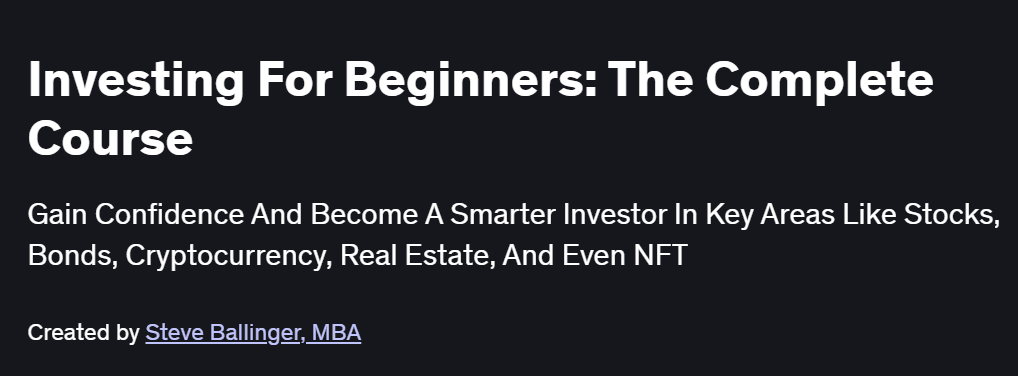What will you in Investing For Beginners Course
- Understand the fundamentals of investing in stocks, bonds, and mutual funds.
- Learn about cryptocurrency and how to invest in it.
- Explore the world of NFTs and how to buy, sell, and create them.
- Develop strategies for building and managing a diversified investment portfolio.
- Gain insights into risk management and long-term financial planning.
Program Overview
Module 1: Introduction to Investing
⏳ 30 minutes
Overview of different investment vehicles.
Understanding risk and return.
The importance of diversification.
Module 2: Stock Market Investing
⏳ 1 hour
How to buy and sell stocks.
Fundamental and technical analysis basics.
Building a stock portfolio.
Module 3: Bonds and Mutual Funds
⏳ 45 minutes
Understanding bonds and their role in a portfolio.
What are mutual funds and ETFs?
Evaluating bond and mutual fund investments.
Module 4: Cryptocurrency Investing
⏳ 1 hour
Introduction to cryptocurrency and blockchain technology.
How to buy and store cryptocurrencies.
Evaluating the risks and rewards of crypto investments.
Module 5: NFTs and Digital Assets
⏳ 45 minutes
What are NFTs and how do they work?
Creating, buying, and selling NFTs.
Understanding the market for digital collectibles.
Module 6: Building a Diversified Portfolio
⏳ 45 minutes
Asset allocation strategies.
Balancing risk and return.
Rebalancing and monitoring your portfolio.
Get certificate
Job Outlook
Investors are highly sought after in sectors such as finance, tech, and real estate.
Entry-level investment analysts can earn between $50K and $80K annually.
With experience, roles such as portfolio manager or financial consultant offer higher earning potential.
Explore More Learning Paths
Strengthen your investing foundation with courses that help you understand long-term wealth creation, risk management, and portfolio-building strategies.
Related Courses
Securing Investment Returns in the Long Run Course – Learn proven strategies to build sustainable investment growth over long periods.
Investment Risk Management Course – Understand risk assessment, mitigation techniques, and decision-making frameworks for safer investing.
Investment and Portfolio Management Specialization Course – Master portfolio design, asset allocation, and performance evaluation for diversified investing.
Related Reading
Deepen your understanding of wealth-building fundamentals:
What Is Wealth Management? – Explore how structured financial planning helps grow and preserve long-term wealth.
Specification: Investing For Beginners: The Complete Course
|
FAQs
- No, even small amounts can be invested today.
- Many platforms allow fractional share investing.
- ETFs and index funds are affordable entry points.
- Consistency is more important than large sums.
- Starting early with small amounts builds long-term growth.
- Investing is long-term wealth building.
- Trading is short-term buying and selling for quick gains.
- Investors focus on compounding returns.
- Traders must monitor the market daily.
- Investing usually carries lower risk than active trading.
- Complete loss is unlikely if you diversify properly.
- Higher risks exist in speculative or single-stock bets.
- Index funds and ETFs lower the risk of total loss.
- Beginners should avoid “get rich quick” schemes.
- Education and patience help safeguard investments.
- Long-term investors don’t need daily management.
- Quarterly or annual reviews are usually enough.
- Automated tools can rebalance portfolios for you.
- Index funds reduce the need for constant oversight.
- A few hours per year can be sufficient for beginners.
- Core investing principles apply worldwide.
- Concepts like diversification, compounding, and ETFs are global.
- U.S. examples may dominate, but strategies are adaptable.
- International investors may need local brokerage knowledge.
- The course provides a universal foundation, not just U.S.-specific.





